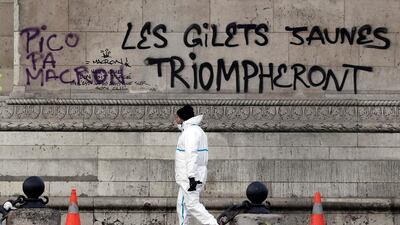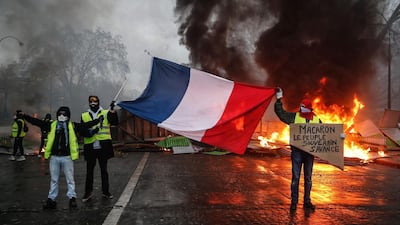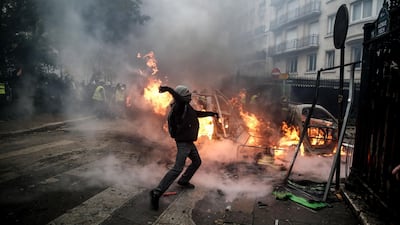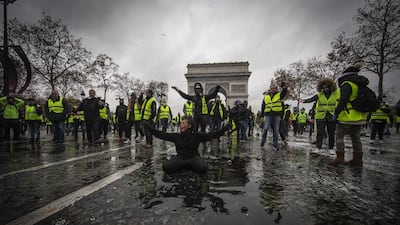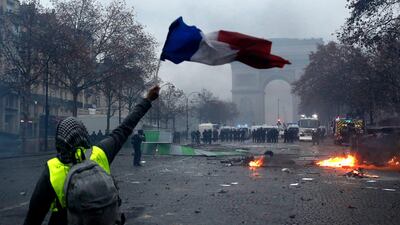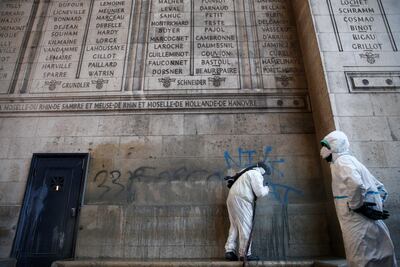French President Emmanuel Macron called a crisis meeting of senior colleagues and security chiefs on Sunday after ferocious violence during fuel tax protests left the heart of Paris resembling a war zone.
Police were overwhelmed as mobs ran riot in the capital, burning vehicles and buildings, attacking shops and restaurants and even scaling and defacing the Arc de Triomphe, a memorial to the French war dead and one of the most revered of Parisian monuments.
Trouble spread to other cities, with an estimated 136,000 “gilets jaunes” – named after their chosen streetwear, the luminous yellow vests drivers must carry in their vehicles – taking to the streets or mounting blockades of roads, petrol stations and shopping centres. One driver was killed overnight in an accident at a yellow vest blockade in central France, the third death since protests began.
In all, 412 people were arrested and 133, including 23 police officers, were hurt. It represented the worst violence the centre of the French capital has seen since 1968 and the biggest challenge yet to Mr Macron’s 18-month-old presidency.
His government has been plunged into a deep political and social crisis by the wave of violence that has accompanied the protests. Ministers do not rule out restoring the state of emergency imposed after the 2015 terrorist attacks and lifted a year ago.
Before flying back to France from the G20 summit of leading industrialised nations in Argentina, Mr Macron denounced rioters and said he would never accept violence.
“No cause justifies that authorities are attacked, businesses are plundered, passers-by or journalists are threatened or that the Arc du Triomphe is defiled,” he said.
Mr Macron said those bent on causing chaos “betray the cause they pretend to serve”. He vowed that those responsible – who had “nothing to do with legitimate protest” – would face justice. The president visited some of the flashpoint locations on Sunday.
Nationwide demonstrations began last month in response to high petrol and diesel prices, aggravated by Mr Macron’s proposed new “ecology” tax.
Although the yellow vests have no formal leadership or organisation, their movement has become a wider campaign reflecting public despair at falling living standards.
Mr Macron, in office for just 18 months, is the chief target of their anger. The yellow vests have won strong support in the polls, though images of the trashing of Paris – and especially such an important Republican symbol as the Arc de Triomphe – may affect this.
Many ordinary people joining the protests expressed outrage at the trouble-making elements. Although a few blamed provocatively heavy-handed policing, it was clear they had been joined by masked activists prepared for trouble.
Officials estimated between 1,500 and 3,000 people infiltrated the Paris protest intent on causing destruction and attacking police. Stanislas Gaudon, leader of the trade union Alliance Police, said officers had faced a situation of “unprecedented magnitude”.
_________________
Read more:
Protest clashes erupt in Paris as anti-Macron rallies return
Five key moments from the G20 Summit
French government stands tough against violent protesters
_________________
Tear gas was fired and water cannons were deployed as officers struggled for control.
The far-right leader Marine Le Pen blamed the extreme left, but ministers and observers of social conflict pointed to the involvement of far-right activists.
At the height of Saturday’s disturbances, some of Paris’s renowned landmarks and upmarket areas – including the Trocadero, boulevards close to the Arc de Triomphe and the rue de Rivoli - were turned into battlegrounds.
Undeterred by strictly controlled access to the Champs-Elysees, the scene of serious rioting at a protest a week earlier, mobs dispersed to other central areas, often unprotected.
Graffiti, including a slogan reading “the gilets jaunes will win”, was sprayed on the supporting columns of the Arc de Triomphe. The monument’s interior revealed damage that could exceed €1m (Dh4.1m), according to Philippe Belaval, president of the Centre of National Monuments. The shop was looted, works of arts – even a statue of France’s most treasured national symbol, Marianne – were destroyed and office telecommunications were put out of action.
Two major department stores, Galeries Lafayette and Printemps, were evacuated, closing early as group of 300 demonstrators gathered nearby. Firefighters came under attack and one demonstrator was hurt when struck by iron railings that were toppled over in the Tuileries gardens neighbouring the Louvre.
Outside Paris, a government building was seriously damaged by fire in Puy-en-Velay, in the south-central department of Haute-Loire. Devices described as “like Molotov cocktails” were thrown at the offices even though the prefect (representative of central government) had received a delegation of yellow vests.
Anne Hidalgo, the socialist mayor of Paris, thanked law enforcement agencies for confronting the “casseurs” – thugs and rioters – and seeking to ensure the safety of the public, including peaceful demonstrators.
“I feel deep indignation and great sadness at this violence in the heart of Paris,” she tweeted. “It is unacceptable. Our country faces a major crisis. It can be resolved only by dialogue.”
French Interior Minister Christophe Castaner attributed the violence to “specialists in inciting conflict and destruction”. Asked on the BFMTV news station about a police union’s call for a state of emergency to be reimposed, he said: “Nothing is taboo for me. I am prepared to examine everything.”
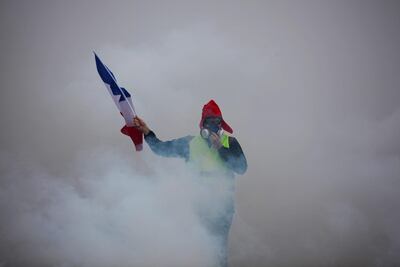
Mr Macron has made it a point of his presidency that he will press ahead with reforms in the face of resistance from those affected, from railway workers to pensioners.
He has offered concessions on fuel, promising to reduce taxation of petrol and diesel when market forces lead to price rises, but this has failed to impress his opponents.
